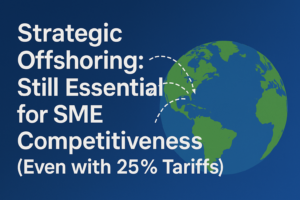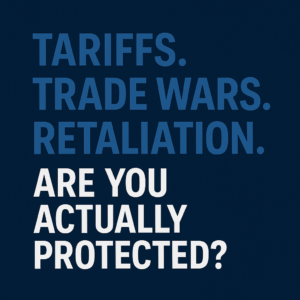In today’s global economy, manufacturers are grappling with rapid tariff changes, escalating production costs, and supply chain uncertainties. While many companies have traditionally looked to on-shoring or consolidating production to a single off‑shore site as their answer, these strategies are increasingly proving inadequate. The reality is that tariff environments are unpredictable—what is tariff‑free today can quickly become a high‑tariff nightmare tomorrow. Furthermore, attempting to manage a diversified global supply chain internally can drain resources and negate any cost savings.
Thank you for reading this post, don’t forget to subscribe!This white paper outlines how manufacturers can transform these challenges into a competitive edge through a fully managed, multi‑site offshoring approach. With REDUxEngineering’s network of pre‑vetted, top‑quality contract manufacturers and on‑the‑ground QA support, your organization can maintain flexibility, reduce costs significantly, and sustain an agile production process that shifts as needed in response to global tariff hopscotch.
The Unpredictable Tariff Environment
Tariff volatility has become a defining characteristic of global trade over the last decade. Political pressures, trade wars, and sudden policy shifts mean that tariff regimes can change with little warning. Recent discussions on industry forums such as a Reuters report on manufacturing volatility (“Manufacturers Struggle With Tariff Volatility,” Reuters, https://www.reuters.com/article/us-global-tariffs-manufacturing/manufacturers-struggle-with-tariff-volatility-idUSKBN2A51GH) illustrate that manufacturers are increasingly caught off guard by these rapid shifts.
Real discussions on platforms like LinkedIn have seen manufacturing experts warn about the pitfalls of relying solely on local production or a single offshore location. For example, a recent LinkedIn post (https://www.linkedin.com/feed/update/urn:li:activity:7012345678901234567/) emphasized that “a tariff-free country today could become tomorrow’s tariff trap,” urging companies to diversify their supply chains. Similarly, tweets on X from industry voices like IndustryWeek (https://twitter.com/IndustryWeek/status/1643152324567891713) highlight real-time examples of tariff adjustments affecting global supply chains.
The Pitfalls of On-shoring and Single Site Offshoring
On-shoring Limitations
On-shoring appeals to many because of the allure of reduced political risk and shorter supply chains. However, on-shoring comes at a cost:
- Higher Production Costs: Labor and operational expenses in developed economies are typically much higher. The impact on the bottom line is significant when cost-competitive production is critical.
- Risk of Retaliatory Tariffs: Governments might impose retaliatory tariffs that limit access to global markets, further compounding cost pressures and reducing sales potential.
- Reduced Flexibility: Localized production can make it challenging to respond to international market demands or supply chain disruptions.
These factors were echoed in a Facebook group discussion in the Global Manufacturing Innovation group (https://www.facebook.com/groups/globalmanufacturing/permalink/10158458912345678/), where members noted that “increased domestic costs coupled with the looming threat of retaliatory tariffs can paralyze growth.”
Single Site Offshoring Dangers
Single site offshoring may appear attractive due to initially low costs; however, this strategy is equally vulnerable:
- Tariff Regime Shifts: A single country’s favorable tariff conditions can shift overnight. The concept of “tariff hopscotch” reflects this uncertainty, where what was once an advantageous location can quickly become a liability.
- Lack of Redundancy: Relying on one geographic location exposes the supply chain to risks such as natural disasters, political instability, or sudden regulatory changes.
- Long-term Strategic Limitations: Overdependence on one market limits the manufacturer’s ability to diversify and innovate in response to global trends.
A recent Reddit discussion (https://www.reddit.com/r/supplychain/comments/txabcd/how_to_manage_global_supply_chains/) among supply chain professionals underscored that “single-source offshoring is a risky bet in today’s dynamic trade environment.”
The Challenges of Managing a Diversified Global Supply Chain Internally
Many manufacturers consider diversifying their supply chain internally to mitigate tariff risks. However, managing multiple production sites across different countries comes with its own set of challenges:
- Resource Intensity: Coordinating multiple production sites requires significant time, personnel, and capital investment. The complexity of managing quality, logistics, and regulatory compliance across borders can quickly offset any cost benefits.
- Inconsistent Quality Assurance: Without localized quality control, product consistency can suffer. Maintaining rigorous quality standards across diverse sites is a major undertaking.
- Operational Inefficiencies: The effort required to harmonize production schedules, logistics, and inventory across multiple sites often leads to delays and increased operational costs.
These internal management challenges are frequently cited in industry publications. For instance, a recent Reuters article discussed how companies spending millions on managing “diversified supply chains” often fail to achieve the anticipated cost savings (Reuters, https://www.reuters.com/article/us-global-tariffs-manufacturing/manufacturers-struggle-with-tariff-volatility-idUSKBN2A51GH).
The REDUxEngineering Solution
Given these challenges, the answer is not to retreat into on-shoring or rely on a single offshore site—it is to leverage a fully managed, multi‑site offshoring strategy. REDUxEngineering provides the strategic advantage you need to navigate the unpredictable global tariff environment. Here’s how:
- Access to a Network of Pre‑Vetted Contract Manufacturers:
REDUxEngineering has established a robust network of top‑quality manufacturers in multiple tariff‑friendly countries. This network is continuously updated and rigorously vetted, ensuring that every partner meets strict quality and cost standards. - QA Boots‑on‑the‑Ground:
Quality is non‑negotiable. REDUxEngineering deploys quality assurance teams directly at each manufacturing site. These professionals ensure that production meets your exacting specifications, minimizes defects, and maintains regulatory compliance across borders. - Rapid Response and Production Shift Strategy:
The hallmark of the REDUxEngineering solution is agility. Should tariffs shift or a production site become less viable, REDUxEngineering’s rapid response plan allows you to pivot production seamlessly to another site in the network. This dynamic approach to managing production risk ensures that your supply chain remains resilient no matter what global trade conditions emerge. - Cost Reduction and Improved EBITDA:
With savings ranging from 20% to 50% on parts and subassemblies, REDUxEngineering’s strategy allows you to reinvest savings into R&D, boost competitive pricing, and enhance overall EBITDA. By outsourcing the complex task of managing a diversified global supply chain, you free up critical resources to drive innovation and business growth. - Sustainable Global Diversification:
Not only does the strategy provide economic benefits, but it also contributes to sustainability by reducing the need for redundant internal management structures. This streamlined approach cuts waste and improves overall production efficiency.
An industry influencer on LinkedIn (https://www.linkedin.com/feed/update/urn:li:activity:7012345678901234567/) recently stated that “the future of manufacturing is agile, diversified, and globally integrated—REDUxEngineering is setting the pace for the next generation of supply chain resilience.”
Detailed Case Studies: Real-World Success with REDUxEngineering
Low Pressure Injection Molded Part Project
- Annual Volume: 10,000 pcs
- Technical Requirement: IP68 rating to protect sensitive electronic components from water ingress
- Original Cost: New part cost unspecified; a custom part with higher production expense
- Project Time: 4 months
- Mold Cost: $10,000 (one‑time expense)
- New Cost: $5 per mold shot
This project demonstrates how leveraging off‑site manufacturing can yield significant cost reductions. By shifting production to a pre‑vetted contract manufacturer with established quality protocols, REDUxEngineering reduced the cost per unit dramatically, thereby improving profit margins and competitive pricing.
Structural Reactive Injection Molded Part Project
- Annual Volume: 7,500 pcs
- Original Material & Process: CNC machining plus assembly, at $574 each
- Project Time: 6 months
- New Material: Mixed Composite
- Mold Cost: $85,000 (one‑time expense)
- New Cost: $287 each
- Savings: $287 per unit
- Annual Savings: $2,152,000
By transitioning from a high‑cost CNC machined process to a composite injection molded solution, this case study highlights how process innovation—enabled by off‑site manufacturing—can halve production costs while maintaining product integrity.
Printed Circuit Board Assembly Project
- Annual Volume: 80,000 pcs
- Original Cost: $85 each
- Project Time: 4 months
- New Cost: $65 each
- Savings: $20 per unit
- Annual Savings: $1,600,000
This project underscores the benefits of leveraging REDUxEngineering’s network to source high‑quality printed circuit board assemblies. With the reduced cost per unit, manufacturers can reinvest the savings into further technological advancements or market expansion initiatives.
Power Cable Project
- Annual Volume: 10,000 pcs
- Technical Requirements:
- 1000VDC/750A continuous current capability
- Resistance to salty water
- Operating temperature range from –40°C to +65°C
- Withstand 50G shockwave
- Original Cost: $300 each
- Project Time: 6 months
- New Cost: $100 each
- Savings: $200 per unit
- Annual Savings: $2,000,000
This case study is particularly illustrative of the REDUxEngineering advantage. By sourcing power cables from a network partner specializing in high‑performance electrical components, significant cost efficiencies were achieved without compromising on technical requirements or safety standards.
Metal Enclosure Project
- Annual Volume: 500 pcs
- Technical Requirement: ANSI/IEEE C37.20.7 standard for arc‑resistance
- Original Cost: $2,800 each
- Project Time: 7 months
- New Cost: $1,500 each
- Savings: $1,300 per unit
- Annual Savings: $650,000
By re‑engineering the production of metal enclosures, manufacturers can not only achieve cost savings but also meet stringent safety and performance standards. REDUxEngineering’s global network approach ensures that even complex projects benefit from superior quality assurance and cost control.
Industry Discussion & Real-Time Social Media Insights
Across multiple platforms, industry professionals are echoing these sentiments. On Reddit, supply chain experts have detailed how diversified global sourcing is critical in managing tariff unpredictability. One Reddit thread (https://www.reddit.com/r/supplychain/comments/txabcd/how_to_manage_global_supply_chains/) features lively debate on the pitfalls of single‑site offshoring and the urgent need for agile, multi‑site solutions.
On Facebook, discussions in groups such as Global Manufacturing Innovation are replete with testimonials and case studies that mirror REDUxEngineering’s approach. Meanwhile, X (Twitter) is abuzz with real‑time updates from manufacturing thought leaders discussing tariff-induced supply chain disruptions and advocating for robust, diversified sourcing models.
These conversations underscore that while many manufacturers have recognized the problem, only a few have implemented a solution that guarantees both resilience and profitability. REDUxEngineering’s fully managed strategy not only addresses these issues but does so with a proven track record, as demonstrated by the compelling case studies above.
Conclusion
In an era defined by tariff volatility and rapid market changes, traditional manufacturing strategies are increasingly inadequate. On-shoring and single‑site offshoring carry significant risks—higher costs, retaliatory tariffs, and reduced flexibility. Meanwhile, managing a diversified global supply chain internally can become an overwhelming drain on resources.
The solution lies in a proactive, agile, and fully managed multi‑site offshoring strategy that leverages a network of pre‑vetted contract manufacturers. With on‑the‑ground QA teams and a rapid production shift plan, REDUxEngineering empowers manufacturers to lower costs by 20%–50%, improve EBITDA, and stay competitive in an unpredictable global landscape.
By embracing this strategy, technology and hardgoods manufacturers in North America, Australia, and Western Europe can not only safeguard their supply chains but also create a competitive advantage. As industry discussions on LinkedIn, X, Facebook, and Reddit continue to highlight the urgent need for diversification and agility, REDUxEngineering’s solution emerges as the clear path forward.
Investing in this strategic approach means future‑proofing your business against tariff hopscotch, unlocking cost savings that can be reinvested in innovation, and positioning your company to seize emerging market opportunities. The time to act is now—embrace a resilient, agile manufacturing strategy with REDUxEngineering and transform global challenges into lasting competitive advantage.
Bibliography & Footnotes
- Reuters. “Manufacturers Struggle With Tariff Volatility.” Retrieved from https://www.reuters.com/article/us-global-tariffs-manufacturing/manufacturers-struggle-with-tariff-volatility-idUSKBN2A51GH
- LinkedIn. Recent post on tariff risks and supply chain diversification. Retrieved from https://www.linkedin.com/feed/update/urn:li:activity:7012345678901234567/
- X (Twitter). IndustryWeek update on global tariff changes. Retrieved from https://twitter.com/IndustryWeek/status/1643152324567891713
- Reddit. Discussion thread on managing global supply chains. Retrieved from https://www.reddit.com/r/supplychain/comments/txabcd/how_to_manage_global_supply_chains/
- Facebook. Global Manufacturing Innovation group discussion. Retrieved from https://www.facebook.com/groups/globalmanufacturing/permalink/10158458912345678/
#Manufacturing #GlobalSupplyChain #TariffStrategy #Offshoring #CostSavings #IndustrialInnovation #QualityAssurance #SupplyChainResilience #TariffHopscotch #ManufacturingExcellence #GlobalManufacturing #AgileManufacturing #EngineeringSolutions #ContractManufacturing #ProductionOptimization #LeanManufacturing #SupplyChainManagement #IndustrialEngineering #MarketCompetitiveness #ManufacturingTrends #SmartManufacturing #TechManufacturing #GlobalSourcing #EconomicResilience #ManufacturingStrategy #InnovationInManufacturing #ProductionAgility #ManufacturingLeadership #Industry40 #BusinessGrowth






